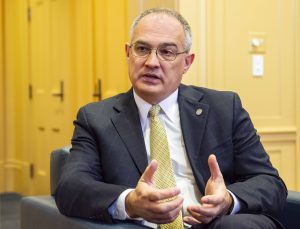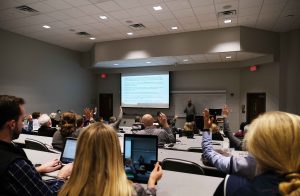The faculty senate unanimously joined the call to relocate the Confederate monument from the Circle to the Confederate cemetery on campus by passing a resolution on Thursday, but the debate over who has the jurisdiction to move the statue continues.
“The Mississippi Board of Trustees of State Institutions of Higher Learning (IHL) is the governing authority for all public universities in Mississippi, including the University of Mississippi,” Caron Blanton, the Communications Director for Mississippi Institutions of Higher Learning, said.

Ole Miss Interim Chancellor Larry Sparks released a statement on Thursday detailing further steps needed to move the placement of the Confederate monument. Photo by Christian Johnson
That designation as the governing body would give the IHL the ability to decide on the relocation of the monument.
Stacey Lantagne, Vice Chair of the faculty senate and assistant law professor called this assertion into question before the vote on Thursday.
“I personally think there’s a decent argument to be made that (the governing body) is all of us,” she said. “The IHL doesn’t make that decision. The courts make that decision.”
The debate over authority originates from another state law which says a “governing body” has the power to move Confederate memorials, but the code does not clearly define what constitutes a governing body.
In an email statement on Thursday, Sparks made his first comments since neo-Confederate groups rallied around the Confederate statue on campus 13 days ago, but he did not say whether he supported relocating the monument.
Sparks said in order to move the statue, he would have to submit the proposition as an agenda item to the IHL Board of Trustees for final approval.
The deadline for the chancellor to submit items for consideration at this month’s meeting has already passed, so the earliest IHL could possibly consider the relocation is April, which remains contingent on Sparks submitting the proposal.
“We appreciate the thoughtful and deliberate consideration that the student groups have given to formulating, debating, and passing their resolutions recommending relocation of the monument,” Sparks’s statement read.
Because the monument is considered a state landmark, the university must obtain a permit from the Mississippi Department of Archives and History to move the statue to the cemetery before submitting the request to the state college board.
Since the weekend of the rally supporting Confederate iconography on campus, two student government organizations passed resolutions calling for the relocation of the university’s divisive monument.
The Graduate Student Council Senate was the first campus government group to pass a resolution on Monday. The Associated Student Body Senate passed its resolution unanimously on Tuesday after circulating a draft within the student body the week before.
“In a shared governance model utilized on most university campuses, the student body, represented by the Associated Student Body at the University of Mississippi, has a voice on issues impacting the campus, along with other members of the campus community, including faculty and staff,” Blanton said. “The institutional executive officer makes the determination on whether to submit an item for approval by the Board of Trustees.”
The faculty senate resolution is very similar to that passed by the ASB Senate, which was supported by various student and faculty groups including the entire history department.

Photo by Katherine Butler
Last night, former members of the now-disbanded Chancellor’s Advisory Committee on History and Context (CACHC) released a statement endorsing the ASB resolution and explaining that they were explicitly prevented from making recommendations regarding the removal or relocation of the Confederate monument during their time as a committee.
“It is plain to us that the Confederate monument does not represent the values espoused in the university’s creed. Its prominent location at the entrance to our campus, moreover, suggests that we continue to embrace Confederate ideology,” the statement read. “And it serves, as the events of the past weeks have demonstrated, as a beacon for neo-Confederate organizations.”
Noonan said the faculty’s resolution is largely based on the original language and research put forth by ASB.
“I think the faculty have spoken in overwhelming support of this, in support of the resolutions passed by the students, and it’s something the faculty have been discussing for years,” he said. “They respected the chancellor’s call to respect the process of the contextualization committee, but there was still a lot of dissatisfaction after that process was over. We’re moving forward.”
Following the faculty senate’s regular monthly meeting Tuesday night, the Senate Executive Committee decided to vote on the legislation this week. That committee also authored the resolution.
While faculty senate met at 6 p.m. to consider its resolution, Staff Council members voted electronically. President Gazel Giles sent out ballots to the Staff Council via email yesterday afternoon, and the official vote count should be finalized today.
“It’s essentially already been passed,” Giles said. “On March 6, the majority of Staff Council members voted to be in favor of a resolution that supported the relocation of the Confederate statue.”

The Ole Miss faculty senate voted unanimously on Thursday night to pass another proposition to move the Confederate monument to the cemetery on campus. They are the third university governing body to pass a similar resolution, sending the ultimate decision on to Chancellor Sparks and the state IHL board. Photo by Daniel Payne
The Staff Council drafted its resolution following this initial vote to gauge opinion.
Giles said she and several other Staff Council members met with Sparks at 2:30 p.m. on Thursday to discuss the relocation of the statue.
“We are very passionate about this issue,” Giles said. “We just took more time to discuss it and understand the thoughts of the entire staff because the council does represent over 2,000 people on this campus.”
The Staff Council serves as an advisory group to the chancellor in issues that affect university progress, and its executive board meets with the chancellor monthly.






